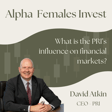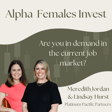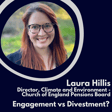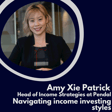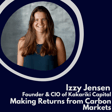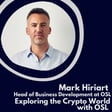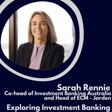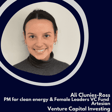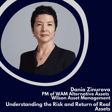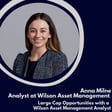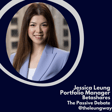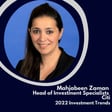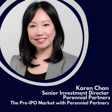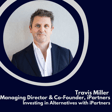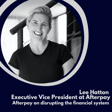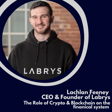Introduction and Guest Overview
00:00:00
Speaker
This is an episode that is unreleased from our archives, back from a recording in mid 2022 with Trena Probert from Super Fierce. We have made some reductions to the initial recording in sections to keep it relevant for today. Trena provides us with an alternative view to investing in your super. And compared to other guests, she particularly shares interesting views on fees being one of the biggest ways we can control end outcomes for the investor. We hope you enjoy it.
00:00:31
Speaker
Welcome back to the Alpha Females Invest podcast. We bring diversified perspectives from the buy and sell side of the finance world. As usual, any information discussed in this podcast is not financial advice. All opinions reflect those of the individuals and this podcast is for educational purposes only. You should always read the PDS and talk to a financial advisor who can consider your personal circumstances before you invest.
00:00:57
Speaker
I would also just like to say if you like what we do at AFI, we would love your support on Instagram. We haven't really mentioned that on the show before, but our handle is at alpha females invest. And we also have a LinkedIn presence if you prefer to follow us through there. And of course our website has all episode information and sponsorship that we receive. So you can find that at www.alphafemalesinvest.com.au. And I just would also add to note that we do get sponsored
00:01:26
Speaker
by guests from time to time. So just something to keep in mind.
Trena Probert's Background and Mission
00:01:30
Speaker
Today on our show, we welcome Super Fierce founder and CEO, Trena Probert, who believes that when women do well, the world thrives. Her mission is to empower people financially so that all people can prosper. She's passionate about people and fluent in finance after almost three decades in the industry. She's designed institutional investments, ran a strategy for a global bank,
00:01:54
Speaker
been a GM for an independent advice business, worked with global CEOs at Amex and spent a decade as an entrepreneur founding three successful businesses. Those experiences together with her personal story being a single mum and starting life again at 34, fire her passion for arming women with the financial tools and support that they need. Super fears is a social enterprise that links deep financial smarts with heart fuel mission to empower Australians to age with dignity
00:02:22
Speaker
and allow women to control their future. Obviously, these characteristics align very strongly with AFI, and so we welcome to the show, Trena.
Career Experiences and Personal Insights
00:02:31
Speaker
Thank you so much. I'm thrilled to be here with you both. As everyone knows, we like to kick off the same question for every guest. So Trena, can you please share with us your most embarrassing career moment?
00:02:41
Speaker
Yeah, it was funny. My husband saw that question earlier and he's like, well, that'll take up the entire time they've allotted for the whole podcast because we're like a really embarrassing person. I think it's almost impossible to answer that for me because
00:03:00
Speaker
I guess a little sideline info is that I was diagnosed at the age of 40 with ADHD. So I went through the first two decades of my career not really knowing that I was marching to a slightly different tune than everybody else. And yeah, at Macquarie, everybody else was in gray and navy pinstripe suits, and I was in canary yellow, red, and pink.
00:03:22
Speaker
hugging and singing a lot so I think I've kind of specialised in embarrassing moments actually I don't think I can narrow it down to one I'm sorry but I'll think about it.
00:03:33
Speaker
Shrena, I have obviously seen you present and you were definitely the colorful inspo for the evening.
Understanding Superannuation
00:03:39
Speaker
So it was great to see. And obviously this episode, we really want to focus on the superannuation industry, which is an area that Chloe and I identified before we started this podcast as one of the areas we wanted to delve into.
00:03:54
Speaker
And obviously, Australia is a very unique market in terms of our mandatory super contributions, you know, rising to 11%. So it might just be helpful for us to have a little bit of background on the current super landscape and its importance in terms of both as a market. Obviously, it's a big amount of money for the Australian industry, but also in terms of our household context as well. Yeah, absolutely. And I mean, you know, if I went back
00:04:22
Speaker
10 years in time. I don't think I would have ever imagined being as passionate and excited about superannuation as I am because it's a little bit like insurance. It's not something you typically think of as something exciting, but, but I got really passionate about it when I realized the power of it to actually help Australians, but particularly women to start to build real financial confidence and resilience for the future.
00:04:49
Speaker
Now, obviously, we think about it in terms of closing that gender retirement gap, which is incredibly important. But it's actually also about the steps that we see women taking along the road, you know, the steps that they take today and then what that makes them then do next, which really increases their confidence. You know, we see women
00:05:09
Speaker
you know, reluctantly get involved with their super and start to make changes and do things with that. But then they kind of stand up a bit taller and you know, the question is always, okay, that was easier than I thought. What can I do next? And that's why I think that's really exciting to get women thinking about their super because
00:05:27
Speaker
It's a very simple way that they can invest a small amount of time to have a massive difference on their ultimate financial wellbeing. And even though it's a long time in the future, the fact that it then gets them thinking about what they can do today is really powerful. So when I started to think about it more in that way, that's when I personally started to spend more time paying attention to it. And as you alluded to, I've worked in financial markets for a long time.
00:05:56
Speaker
So it wasn't that I didn't know about super. It's just, I, like everybody else, wasn't deeply interested in it. It was kind of something that happened to me rather than something that I participated in actively. But it's interesting to me that in this country where we have this strong defined contribution pension scheme, which means that we're renowned globally for having one of the most sophisticated and admired systems that were so critical of it domestically.
00:06:24
Speaker
And that's a good thing really, but I think it's important to note that we do have this amazing system, but we're critical because we can see that we can make it better. But it is one of the largest pension systems in the world. And what really defines the unique characteristics of that is the fact that it's the largest per capita defined contribution scheme in the world.
Ethical Investments and Gender Gap
00:06:46
Speaker
Now you mentioned the 11%.
00:06:48
Speaker
So we're already going up to 10.5%. In fact, we've probably already gone up to the 10.5% now with those compulsory contributions. And it's already legislated to go up to 12% by 2024. And now that we have a new government with Labour, which is talking about increasing that to 15%,
00:07:08
Speaker
it's becoming a really vibrant conversation, whatever side of the argument that you land on with that. But as you said before, when you consider that there's more than $3 trillion, $3 trillion in that asset pool, there are significant implications for the market that we do need to discuss. And I think it's a really great point that you made.
00:07:31
Speaker
And there are interesting things going on in that space at the moment. There's a lot of discussion about divestment from super funds out of certain assets within the ethical sustainable landscape. So there are going to be really interesting flow on impacts. And I'm really interested to see what happens as super funds are under more pressure to become more active with this decision making and how they're investing those funds. And what are the implications of that?
00:07:59
Speaker
selfishly as a female founder on the startup journey. It's really interesting to me to see how active the funds have become in funding investments, new businesses via the VC community. So I really hope that we will start to see some greater divestment through those funds into female founder businesses. Let's hope I'm not howling at the moon. That's a whole other conversation. But
00:08:26
Speaker
I do see that there are so many people today, particularly women through our system, where we see they're actually choosing ethical, sustainable fund options. And that's where they're leaving a lot of money on the table as well, where they see that they could be paying a lot less in fees and retiring with more, but they care about the future. They care about the world. And so, you know, they're voting with their feet in that way. And I think that that is going to put continued pressure
00:08:54
Speaker
on the funds to consider how they're investing. I think that's a good thing for all of us as well. So, you know, caring about super, being critical about super, loving super, there are so many different aspects of this, but personally, you know, I think when Bob and Paul got together all those decades ago and started talking about bringing this system into place and not everybody loved it,
00:09:19
Speaker
Not everybody does. You know, they really did us a big favor individually and as a nation. Now, some people think that was a very paternalistic approach and there are some dangers that come with that, but there are positives as well. And for me, one of those that really stands out to me is that humans by our very nature have present bias. We're much more focused on
00:09:43
Speaker
know, what we care about today, how we feel today, the demands and pressures of today, or our dreams for today, what we want today, so saving for when you're old and wrinkly isn't really what any of us are focused on. So, super is an important system because it relieves a lot of pressure on individuals to make good decisions for themselves for the future and that ultimately relieves some of the pressure on social infrastructure
00:10:08
Speaker
And ultimately, I believe it's going to put people in a better position than if they were left to their own devices to save for the future. Now, obviously, there are significant problems that need to be addressed. But thankfully, that's the case because that gives me something to do every day when I come to work. As you have said, it's such a huge industry that applies to so many Australians. And we know a lot of smart people, even who work in finance, who really don't have any idea about how their super is invested.
00:10:38
Speaker
So given that, is it important to know what is in your underlying holdings in your Superfund or does it not really matter as long as the fund is diversified and adjusted for the appropriate level of risk in your portfolio?
00:10:50
Speaker
Yeah, look, I think it's a depends answer, which is not necessarily always helpful. But I guess for me, there are two answers to that question. So if you want to invest ethically and sustainably, and you truly care about that, then transparency is important. You need to know where your funds are being invested so that it's reflective of what matters to you. If what you actually care about more is that your money is invested wisely,
00:11:19
Speaker
with a view to delivering consistent returns over the long term, then I think it's less important where it's being invested and more how much you've been charged for it and are they doing a good job of managing it for you rather than the underlying holdings themselves, unless you, you know, as I said.
00:11:37
Speaker
unless you have a particular reason to care about that, that would be my position on that. And, you know, as I mentioned before, we're absolutely seeing a significant swing towards people wanting to invest in ethical and sustainable. And we're actually seeing people leaving money on the table deliberately, time and time again lately,
00:11:56
Speaker
because it matters so much to them. So they could be saving a lot more in fees and retiring with more by moving into a low cost fund where there's less commitment to that type of investment thesis, but they're choosing what matters to them. That's a different conversation again.
00:12:11
Speaker
You mentioned a couple of these trends in your initial question, but I guess one of the big factors we see on the asset management division, so where I work, there's two trends that are happening. The first is an internalization of superannuation money. We're seeing a lot more superfunds manage their holdings in-house as opposed to externalization with fund managers.
00:12:37
Speaker
I guess the other thing we're seeing is some super funds get so big that they're really having to stretch where they're investing because they're saturating the market. Are these having any important consequences for people's money or how the investment market works? Look, I'm happy to take a stab at it. You know, I'm probably not the expert in this space, but from my perspective, if there are funds that can do a good job bringing it in-house, I love that idea because typically means you're going to get charged less fees.
00:13:07
Speaker
So when people are using external fund managers, you've got more and more layers of fees, you know, and the Grattan Institute, perhaps unsexily, but accurately pointed out that fees are persistent, performance is transient. So, you know, we really believe that for most Australians, the first thing that they should be looking at is fees, because that's literally the only thing they can have any confidence about knowing what they're going to pay and how it's been used and so on.
00:13:35
Speaker
From that perspective, I don't know, but it feels like there's potential for that to deliver good benefits. In terms of the divestment of those funds and where they're being invested, that's definitely a much bigger conversation, as I alluded to before.
00:13:52
Speaker
selfishly, I'm really interested to see a lot of those funds starting to flow into earlier stage investments and into the venture capital environment. So I feel that there's real value in that and long-term investments people, we love a bit of diversification. So for a lot of people, it's impossible to have access to those sorts of assets in a typical investment portfolio. So
00:14:17
Speaker
There could be something in that, but you probably need to line up a chat with my co-founder Craig about all of that at some point because he definitely knows a whole lot more about it than I do. But yeah, I think that we should be caring about that as an investment community, absolutely. I think they really care though. What I'm excited about is seeing that
00:14:37
Speaker
those super funds getting really active and involved in obtaining information and really leaning in to try and make the best of those funds for Australians. You just touched on fees there and the fact that your platform recommends the option with the lowest fees. So coming from some women who's career is in active management, are fees truly the biggest driver or is it performance after fees should be the measure that we're really looking at given that it's potentially more representative
00:15:06
Speaker
of the end outcome for the client. So given that, what circumstances would you recommend passive options only? So two girls whose careers are in active management. That's a whole other conversation, and I totally don't want to put you guys out of a job. I guess what we're talking about here is a little bit different in any case. I mean, as you alluded to before, we're talking about a long-term investment asset.
00:15:30
Speaker
for most people 2034 year investment horizon so what you actually need is a strategy which is going to deliver consistent returns over time through different market cycles right so we're wanting to smooth out the volatility and deliver long term consistent performance.
00:15:49
Speaker
And so we do care about performance, but as I alluded to, fees are something that we've got a greater ability to control and understand than performance. And as you would have written 90 million times, past performance is not necessarily indicative of future performance. And there's actually a really, really good reason why they make us write that over and over again, because
00:16:15
Speaker
there isn't any evidence that comes with that. Now it's more complicated than that obviously but the reason why we think it's really important to make sure that there is an emphasis on looking at fees first is because it has a massive
00:16:32
Speaker
impact on the ability for the fund to deliver over time, right? And so then the other part of that as well is that there are so many different fees inside super funds that people just don't understand. And the impact of a fixed fee plus a variable fee at different ages is really different as well. And that's often not understood by people.
00:16:56
Speaker
But so, you know, for us, our job is to maximise the chances of the average bear being able to achieve their financial targets, right? And, you know, what history tells us is that passive management has done a better job at this than active management in general.
Evaluating Super Funds for Better Choices
00:17:15
Speaker
And certainly, you would see that happening in the market at the moment, that there's a bit of a people are reacting to volatile markets. You would be seeing a lot of that, so without confusing people. But to talk about the way that our platform works for a moment, if that's okay with you guys, because it's important to clarify.
00:17:36
Speaker
So we use research data that narrows the universe of funds, that looks at performance post fees that are relative to its risk. So using strategic asset allocation as a proxy for risk.
00:17:53
Speaker
First, we remove funds that haven't outperformed their peers because we do care about performance is probably the short version, but we care more about what we can control and understand than what we can. And our platform analyzes every fund, every investment asset in the marketplace. It's completely unbiased. It's quantitative. We're all about making sure that people can work out what's best for them.
00:18:17
Speaker
and unraveling the complexity, bringing transparency to what is quite an opaque industry, really.
00:18:24
Speaker
So we remove the funds that have not outperformed their peers, again, on a like for like level of risk over the last 15 years, or if they're younger that haven't outperformed over their life. And tell me if I go into too much detail here. Then we eliminate funds that aren't outperforming their peers for at least 50% of those years. Then we eliminate the funds that haven't been consistently good performance across all of their different investment options.
00:18:54
Speaker
What that means is that out of 300 funds in Australia, 18 of it make it to our Fierce Performers Index. The Fierce Performers Index is a rating system that's really combining a consideration of
00:19:10
Speaker
the fees, but then also in the context of performance, but over a 15 to 20 year period. So that what we're doing is we're looking at the way that a fund has performed through different markets. So we're looking at investment periods through good markets and poor, recent markets and older, you know, five, seven, 10 and 15 year terms.
00:19:34
Speaker
so that you're actually, and sadly, or probably in this case, it's great, last 20 years, we've had a bit of everything. We've had a global financial crisis, we've had COVID, we've just had a bit of everything, bit of war, bit of everything. So what that means is that, I shouldn't be flippant, but in this context, it means that being able to look at the way that a fund is performed through those different investment cycles
00:20:02
Speaker
does start to give you a better understanding of how it might be likely to perform over the next 15, 20, 30 years because you've been able to see how it performs through those different investment markers.
00:20:16
Speaker
And that's what we do. So we don't just look at low cost. What we're looking at is the low cost option that's offered by those fierce performers and that suits the investor. Does that make sense? Like it's quite a convoluted answer, I guess, but the reality is that we are looking in the context of that. The only thing we can be certain about is fees, but by looking at performance through different investment cycles over a meaningful period of time,
00:20:46
Speaker
Thanks China and I think that provides some useful context to how you think about the supermarket at Superfierce. I did want to touch a little bit more on the market and then we can dive into the specifics of your business but you know you did mention over the cycle we're talking about long-term returns, we're talking about volatility, that has been something we've really been seeing in the past few months. I think it's been a really challenging market for everyone. You may log onto your Superfund and see that it's dropped
00:21:14
Speaker
a fair amount and then people kind of start to get a little bit nervous. Like, is that a reason to be switching your super at this time or is that more of a reason to stay put or perhaps top up should you be able to? I mean, like, is this the time that you should be thinking about other options in your super or is it the time that you should encourage stability in your portfolio? Yeah. And this is a tricky one for me because typically I say to people, if you want to invest, right, you need to have
00:21:42
Speaker
conviction and you don't want to be jumping around actively whenever the investment market jumps up and down. We're not talking about sophisticated investors right now, so we're talking about the average bear really. But at the moment, I guess for me in short, yes, you should definitely be looking at it at least.
00:22:04
Speaker
And that's because you want to make sure that whatever fund that you're with on the way out of this market is a solid performer and delivering good value. So it's not saying that you should be jumping around all the time. Definitely not like super is a long term investment. But, you know, it's definitely a good time to take a look. However, there is a track here. So if you're chasing past performance,
00:22:31
Speaker
you know, markets like this, you know, it's something to watch because if you're blindly looking at performance in the most recent past, you can actually switch to a fund that's done well in the bull market that just ended. And if you did this in 2008, as an example, you guys are probably too young to remember that, but I was at Macquarie then. So if you did this in 2008,
00:22:53
Speaker
you probably would have switched into MTAA, which was the best performer in the prior five years, but they were then the worst performer for the next five. And that was because they took higher equities risk, which benefited in that three years prior, but then suffered in the global financial crisis. And that's why we look for outperformers, but only those that have outperformed in good and bad markets.
00:23:19
Speaker
You know, and that's why for most people, you know, you really want to be careful about what you're doing in this. If you don't have the expertise to understand the complexity of these things, you need to get good advice. Yeah, that aligns really well for our next question about getting financial advice. What is your view on self-managed super funds? And is there typically a minimum that you would recommend people consider before opening one up? And what I guess are the key considerations for running an SMSF?
00:23:48
Speaker
Yeah, look, it's a great question. And it's really important to just note quickly that SuperFierce, we don't look at SMSFs. It's not something we offer as an option. But for all my sims, I have done a bit of work in this space in the past. So I can just share my point of view on this, which is that we always see a lot of people setting up SMSFs because in a very strange super way, they're seen as being a bit sexy. But
00:24:14
Speaker
I think it's important to be careful. We believe that you need to have more than $500,000 in super for it to be really a suitable option for you. Why? Because there's actually some quite sophisticated requirements around auditing and reporting on that. And you need to be aware of this and either have the capacity to manage that effectively yourself and you know, you will get a call.
00:24:41
Speaker
from the regulatory bodies to reporting on that.
00:24:45
Speaker
So you either need to be able to do that or you need to factor in the fact that you're going to need good advice and be able to maintain the costs of that. But you also need to have a really good reason for doing that. And typically, I would suggest that that's only if you're wanting to do direct investing into shares, typically unlisted shares or property. So it's not something I recommend for everybody. In fact, I can't recommend anything on this space. It's not my area, but just my personal view on that.
00:25:15
Speaker
But there are other things that you can do. So one of the reasons why people might like to do that and, you know, the self-depaired active investors. Right. So.
00:25:25
Speaker
If you do like to manage your own money and you want to take a hands-on approach to what's happening with that, I think that's great. But there are ways that you can do that if you are below that threshold and really stepping into having more sophistication around what you're doing and greater wealth to invest, where you can actually manage the way that your own money is invested via the Superfund platforms as well. So, you know, they're called member direct fund options or RAP platforms.
00:25:52
Speaker
And that's a great way actually to start to play with that and learn. And for people who do want to take an active role in that, I think it's a great way to do it. Yeah, that's great.
Super Fierce's Mission and Platform
00:26:01
Speaker
Thanks, Trena. And, you know, you did touch a little bit on the platform that Superfierce offers, but I guess taking a step back, why did you decide to start this business? What was the gap in the market and what is really your purpose statement? And like, you know, why do you exist?
00:26:18
Speaker
Yeah, obviously it's probably my favorite question to answer in the world, which is that, you know, as I alluded to before, you know,
00:26:27
Speaker
I didn't really care very much about super before either. You know, it's just kind of something that happened and you know, it was important, but it's not really the sexiest investment in the world typically for most of us. But for me, where I got really interested in it, you know, like most women, I was frustrated by the gender pay gap, frustrated by the inequity that I saw and how long the glacial glacial pace of change in closing that gap.
00:26:57
Speaker
And as I mentioned, I mean, I'll be 50 this year, right? So I've been on this journey for a long time, right? And it's just too slow. And I'm kind of a jump in, smash things apart, kind of get stuff done, kind of a person. But so I was frustrated by that. And I was looking at the $30 trillion global gender wealth gap. And I'm like, Oh, my God. But it was then when I was noticing things like, you know, the fastest growing homeless demographic in this country, single women over the age of 55.
00:27:26
Speaker
and nearly 50 and I was a single mum not that long ago, felt very close to home. And seeing that, depending on which numbers you want to look at and how you want to cut it up, but 47% gender retirement gap, that was really what prompted my excitement about building a platform.
00:27:49
Speaker
a scalable advice solution that arms women not just with financial education. Financial education is great, but sometimes it's not enough to arm them with a digital tool that would analyze every single option in the market, give them personalized advice and show them how they could save on fees and move into a fund that was going to put them in a better position.
00:28:15
Speaker
And the average savings over the lifetime of the average Australian woman is $102,000 in unnecessary super fees. So when you think about the impact of that on closing that retirement gap, it's significant.
00:28:33
Speaker
And you know, there's a personal side to this story for me. I've had a pretty high flying career in my 20s for all intents and purposes from the outside. It looked like I had everything going in my favor. I certainly understood finance, but at the age of 34, I had to borrow $3,000 from my parents to leave an unhealthy relationship in a harvest I've mentioned in Sydney.
00:28:55
Speaker
with a very chubby, gorgeous, but demanding 18 month old boy under my arm and literally start my whole financial life and my whole life again. And this happens all the time. And it happens because, well, a whole range of different reasons, but it's why I'm so passionate about trying to educate and empower women to understand the very simple things that they can do to make super work hard for them
00:29:25
Speaker
so that they're going to be okay as they move into the later years of life. And my experience is that when we help women with this, they then lean in. They're like, okay, well, that was so much easier than I thought it was going to be. I'm standing tall. I feel good. What can I do next? And that's why the next step for us is we're working really hard under the bonnet at the moment.
00:29:48
Speaker
of really building out. So we're transitioning to a subscription service and will comprise financial education, but also lots of amazing tools and support services with scalable advice at the foundation of it to really support women on their journey to getting financially fit, but without the blood, sweat and tears.
00:30:08
Speaker
That's so powerful, Trena, and we totally agree with a lot of your comments around trying to reduce the gender inequality in finance. And it is part of the reason why we actually started this podcast. So can you tell us a little bit more about your super fierce platform? Yeah, look, everybody's there. So we've handcrafted databases about every single super fund and every investment option in the marketplace. Obviously, we can only give you access to the ones that are open. So there are some that aren't open to other people.
00:30:37
Speaker
So there's over 500 super funds and different investment options in there. And we unravel every single fee and every single one of them have access to the PDS for each of those funds.
00:30:50
Speaker
and our algorithm interrogates each of those based on the information that a customer will put into the platform on their way in. To give you an idea, our platform generates a digital statement of advice. I'm assuming your audience may know, but maybe some don't. A statement of advice is a legal document that we're required to provide as the holder of an Australian financial services license.
00:31:16
Speaker
That's a really important document. We've worked really hard to make it easier to understand than the average one. You know, there's colour and, you know, real words in there and so on as well.
00:31:26
Speaker
We provide that free. A statement of advice is something a financial advisor would charge between three, four and a half thousand dollars typically, but it's so important to us that a woman can have access. Everybody, 22% of our customers are actually men, but we focus on women first, right? So it's really important to us that women have access to this information and advice that they can trust. So our platform runs a minimum of 182,000 calculations.
00:31:54
Speaker
to generate that digital statement of advice. And in that is an analysis. We don't show all of the analysis because we know nobody's going to read it.
00:32:05
Speaker
I won't use a name, but we're not like one of the typical comparison funds, which their marketing lens, you get served what's been paid for the most. We're completely independent, 100% unbiased. It's purely quantitative assessment and recommendations because we really want women to trust that the information they're being provided is in their best interest.
00:32:29
Speaker
Thanks, Jenna. That sounds really interesting and very much a useful tool to understand the fees because, like you mentioned, a lot of people are probably not going to go in and read the PDS of the Superfund. And if they did, they probably wouldn't understand what all of those fees even meant and the technical terms that are involved. So I think it's important to have plain English advice.
00:32:50
Speaker
What is also really interesting about yourself is that you're obviously a female entrepreneur in the fintech space and you're targeting majority of female audience.
Challenges in FinTech and Trena's Journey
00:33:02
Speaker
So I guess if you could talk us through some of your experiences, you know, we hear that typically female founder led businesses tend to get less access to capital. Have you found that or what's been your journey as being a female entrepreneur and fintech?
00:33:16
Speaker
No, that deserves a whole podcast of its own, but I guess the short answer is that the numbers simply don't lie. Depending on whose numbers you believe, but it's around 2% of VC funding goes to female founders. 2%. And yet 50% of the world's population, at least, are women.
00:33:40
Speaker
who require products and services that are designed for their specific needs, where you control women and typically control 80% of household spending. And so I think that there's a real gap and there's an arbitrage opportunity out there.
00:33:57
Speaker
for investors who are willing to back female founders because we build and run great profitable businesses, but we also know how to build them in a way that are targeting a segment that is largely ignored, and that's 100% true. It's amplified within financial services, absolutely, where typically products and services, despite a bit of pink washing from time to time, they're not actually really designed for the very different
00:34:27
Speaker
life journeys that women have and with all love and respect to the wonderful men and everybody in between in my life and the world, right? But men on average live a fairly homogenous life in terms of their earning trajectory. Whereas women really do have very unique lifestyles with so many different permutations.
00:34:48
Speaker
And so the need for products and services within FinTech and financial services, that's not just about doing what's always been done, but truly delivering to the different lives that women have is really critical. And so
00:35:03
Speaker
Unfortunately, on the funding side, what's really challenging though, and it's not dissimilar to the conversation about roles on boards. People go, oh, well, you know, it's not fair, but the reality is if you have a best person for the job and a business has been built by men and it's largely determined in that way. And for men, like the best person for a job often looks like the person who founded the business. It's why we actually need more women building amazing businesses
00:35:31
Speaker
where it's possible to live a very different type of lifestyle, where it's possible to have genuine flexible working, where it's possible to be a carer,
00:35:41
Speaker
and to look after families and do those things and still have a sustainable, scalable pathway in your career. And so the flow on impact of all of that though, is that often the majority of people making decisions about where the money flows from a VC perspective. And I know loads of these guys, I've been on the other side of the ledger, like they're awesome. But at the end of the day, we tend to invest into things we understand,
00:36:10
Speaker
We tend to invest or hire people who look more like us, act like us, because you've already got an existing readiness level. And, you know, anybody who knows my husband and I, and, you know, we've both worked at Macquarie, we've built businesses together, everybody thinks that he is the risk taker.
00:36:32
Speaker
but I have a much bigger risk appetite than he does. And yet if we're in the same room, he will be asked the growth questions and I'll be asked all the risk questions. And so there's definitely some unconscious bias that's baked into that. But there's also just a complete dismissal of the fact that if you look at the numbers, women build scalable, profitable businesses.
00:36:58
Speaker
Again, the numbers don't lie. So the short answer after my long winded answer is, yeah, like you need to be a bit Lara Croft tomb raider out there. If you want to navigate that process, it's not easy. You touched on it briefly, but given your time at Macquarie, which is obviously a very large investment bank, and now you've transitioned to a CEO of a small purpose led organization, would be really interesting to understand how your day to day differs. And I guess what challenges you didn't expect
00:37:28
Speaker
to be when running a business really from the ground up? Yeah, my answer is less direct than that. It's more circuitous because I talk myself into a redundancy at the age of 29.
00:37:41
Speaker
at Macquarie and for any of the young listeners out there, I strongly recommend this as a strategy. If you want to have a chat about that, always open to the calls. But, you know, I talked myself into a redundancy because I'd wanted to set up my first business before I turned 30. So the entrepreneurial journey is not a new one for me. The way that I actually ended up back in the big end of town was as a single mum, you know, I really needed to get more financial security in my life.
00:38:10
Speaker
And so it did a number of different things that met that i ended up at my private bank i was always in product engineering roles really so always building products and solutions within an organization and.
00:38:24
Speaker
you know, Macquarie is for an A-type personality who loves to work hard, strive, never stop, freedom within boundaries. Like it's like the most amazing playground. So I actually loved working at Macquarie despite some of the challenges, but you know, when I left Macquarie, I set up another business and then I set up another business and then I set up another business and then I set up another business. So I've actually been doing this for a long time.
00:38:53
Speaker
And I think the real answer to this is that I've always been a natural entrepreneur, whether I was inside an organization or outside of one. I mentioned I've got ADHD. I don't have an off button. So my world actually hasn't changed that much. It honestly hasn't. The only thing that's changed is I get to be more brutal about
00:39:19
Speaker
what I will and won't do, who I will and won't work with. And for me, that's really critical. So I have a framework that I use called the Good Willing Enable, and I use that framework for everything, whether it's hiring people, choosing who I will do work with, won't do work with.
00:39:37
Speaker
taking on investors. It was such an important part of my process of choosing whose money I would and would not take last year. And that sounds like an arrogant thing to say for a startup, but having learned the hard way, all money is not created equal.
00:39:55
Speaker
You know, it's more than a marriage. Like, you know, your investors are with you for a long time if you're planning on doing a good job. So you want to be really careful. And for me, the good is about values. The willing is about attitude. And able is about aptitude and getting a beautiful mix of those three. So that's probably the biggest change for me.
00:40:16
Speaker
stepping outside of a large organization where you have to fit into everybody else's agenda. Now you asked about the most embarrassing moment at the beginning. I literally can't marry them down, honestly, because I think the biggest thing for me was
00:40:31
Speaker
I just wasn't very good at fitting into other people's frameworks. You know, it's why I set up my first business at 29, because I just couldn't imagine anybody hiring me again. So I think for me, the biggest change is that
00:40:46
Speaker
For somebody who's going to step outside an organization, if that's something they're considering, there's no safety net.
Values and Charity in Business
00:40:54
Speaker
As a founder, everything is on you. And I'm a mother as well, and so everything is on you. So I literally never stop thinking about the business. And I never stop thinking about the business for a range of reasons. One, I take my responsibility to my shareholders very seriously.
00:41:15
Speaker
So I'm always thinking about, am I doing the right thing? What are we going to do next? How are we going to survive a bear market? Blah, blah, blah, blah. I also care deeply about our mission and what we're here to do. So I'm always trying to hold us to account. And when it gets hard and, you know, I'm exhausted up at 3 a.m. again, you know, it's reminding myself why it matters, why we're doing this.
00:41:38
Speaker
So I'm always thinking about that, but I'm also thinking about everyone in our team all the time. You know, it's not my first startup very day. I've been on this journey for a long time. Sometimes all you're left with is a dodgy teacher and that's not good enough for me. So I make sure in our business that every single day I'm thinking about making sure that our team is growing and evolving, that they are getting something great out of this experience.
00:42:04
Speaker
and making sure that at least every day, one customer, we've made their life better. Now, at this point, we've already put $70 million back into the retirement savings of Australian women. So if we go no further than today, our team knows that we've succeeded.
00:42:21
Speaker
it's not enough we're not stopping but it's that sort of thinking that is different i think because you have to set the agenda every single day you need to find a really good reason to get up and keep going because nobody's going to call you and make sure you're turning up.
00:42:38
Speaker
It's that difference. And for me, that's why being a values based organization, you know, we're not a cherry on top kind of an ESG business, you know, we've got impact baked into the heart of our model. It's why we're doing what we're doing. It's why we care about what we're doing. But it's pretty awesome because it means, you know, there's no excuse not to get out of bed either. I think that's one of the key differences.
00:43:04
Speaker
There is a lot to unpack in what you just said there. And, you know, I feel like Clooney and I can resonate with never stopping. I mean, we do this outside of our very hectic work lives as well, but it's a passion, right? And that is what allows you to keep going. And that's why you want to keep doing it because you feel like you're making somewhat of a difference to someone, which is really great. And I think it was quite evident through your description that, you know, you are very much a purpose-led organization.
00:43:32
Speaker
And one element of that is your donations that you make for every customer that joins your platform which is a really nice alignment with what you're trying to do so i was interested to understand i guess.
00:43:47
Speaker
What is the decision behind that? What are the second order impacts of having a strategy like that? Is it attraction of customers? Is it engaging staff? Is it actually just helping other people and having that means to do your investors like it? I guess just unpacking a little bit more of that charitable model that you've adopted. Yeah, absolutely. It's actually the heart of everything that we do, honestly.
00:44:16
Speaker
When I was building SuperFierce, what I wanted to be able to do was to empower women who already have the chance and the ability to do better through SuperFierce. So SuperFierce is profit for purpose.
00:44:33
Speaker
But what I very unsexily needs a marketing person call our ecosystem as our self-sustaining social impact ecosystem. Need a marketing person on that. But what it means is that the way that the model is structured is that the impact outcomes that we drive through Fierce Impact are directly correlated to delivering commercial success for our shareholders.
00:44:57
Speaker
How do we do that? The way that it works is when SuperFierce drives a strong economic outcome for a customer, which has a flow on social impact outcome to be measured as well. But when we do that, it triggers another action within SuperFierce, which is the economic engine room of our ecosystem, right? So it's driving commercial value for SuperFierce.
00:45:21
Speaker
It triggers a donation across into SuperFierce to fund initiatives helping marginalised women. So that's the other group we want to help. We don't want to just help the women who are doing okay and can do better. We want to make sure that we're helping marginalised women in Australia who've already fallen beneath the cracks. Now, when we sort them all out, we'll go back to the beginning and we'll attack the issues that lead to those problems in the first place, right? Which is part of what SuperFierce is doing as well.
00:45:48
Speaker
This is absolutely at the heart of what Superfierce is and how I've designed it. You know, through my whole career, I've always worked around NFPs, whatever I've been doing, I've always been drawn to that and wanting to help it. Always frustrated, always frustrated by the model. Good people doing good work, but spending half the time walking around with their hand out trying to get the funds to do it.
00:46:11
Speaker
I then had, you know, some great success with venture philanthropy, you know, which I dabbled in and experienced some great results for NFPs here in Australia. So I kind of drew on those experiences. So on the fierce impact side, I always wanted to be able to fund and support scalable initiatives, helping marginalize women in Australia. But I did not want that team walking around wasting time trying to raise funds. So that's how the model works is that Super Fierce does that job.
00:46:40
Speaker
That's why that $100, now we're going to change our pricing model soon and the business model soon as we shift to subscriptions. So the equivalent of that is 10% of our gross revenue. And that's really important to me. Let's have a meaningful number. Let's not have cherry on top financial wellness, social NFPs. Let's be meaningful. Turner, did you say 10% of your profits or 10% of revenue? Revenue.
00:47:04
Speaker
The reason why we say $100 at the moment, we need to shift the way that works. So in the model itself, it's 10% of gross revenue. A lot of people don't understand percentages, right? So we always translate that into a dollar number so people actually know the actual dollar number is important.
00:47:20
Speaker
But the reason why gross revenue matters is I don't want people to have any cause for suspicion about what we're doing, what we care about, how that money is being used. This is not just to drive marketing for us. In fact, we do a terrible job at the moment, actually, of talking about what we're doing in this space, right? Because it's not why we do it.
00:47:46
Speaker
The reason why revenue matters is because if we make it on profit, how do they know? There's so many smoke and mirrors. Sorry, Macquarie, I love you, but we're good at smoke and mirrors. Finance, we're great at this stuff. I want women to be able to trust that the information we provide is unbiased.
00:48:06
Speaker
right? It's in their best interest. And I want them to trust that when we say that we're donating money to help women, that they can understand exactly how much money is going to do that. And that's why. And so for us, does it help in engaging staff? Absolutely. Like, you know,
00:48:23
Speaker
We have some amazing people around our business who otherwise there's no way, right? I can't afford them. There's no way, but they really believe in what we're doing and why it matters and they want to be a part of it and they love how we go about it. Certainly all of our investors who came into our first round, we did our seed round at the end of last year and
00:48:46
Speaker
It was quite late to be doing it. You know, we already had quite a lot of customers and revenue, but I was absolutely determined to bake this donation into the business model and prove in market that we could do this before raising capital because I didn't want to have the conversation. Is it enough? Should you now blah, blah, blah, blah, blah? Which obviously came up. So there's that in term of attracting customers, when we do a better job of talking about it, I'm sure that it will.
00:49:14
Speaker
Shout out to my new marketing people, look forward to sorting that out for me. Thank you for coming onto the episode and giving us some context around the superannuation market, around the mission and purpose of Superfierce, which sounds like it's going to be a big success and a big assistance to females taking financial power and saving money, which is critical. We know with compounding that that just adds up and anywhere where you can save costs and
00:49:42
Speaker
contribute more to your future is obviously so important for independence, particularly for women, but also across all genders. And also even just sharing your entrepreneurial experience and your corporate experience, I think that's had some really great lessons for Clooney and I. And I know that one thing that I will be more open to is, you know, potentially other steps outside a linear career path. So that's one thing that I have really taken away. So thank you so much for coming on and chatting to Clooney and I.
00:50:10
Speaker
Well, thank you so much for having me. It's been wonderful. Thank you for listening to the Alpha Females Invest podcast. If you like this episode, we would love your support on Instagram. You can find us at Alpha Females Invest. You could also leave a podcast review, but most importantly, please keep listening. See you next time.


